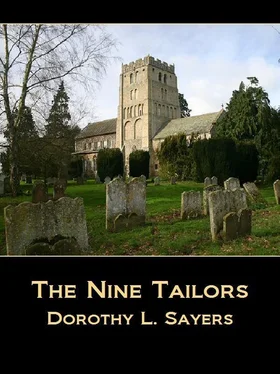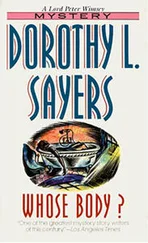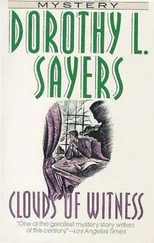Dorothy Sayers - The Nine Tailors
Здесь есть возможность читать онлайн «Dorothy Sayers - The Nine Tailors» весь текст электронной книги совершенно бесплатно (целиком полную версию без сокращений). В некоторых случаях можно слушать аудио, скачать через торрент в формате fb2 и присутствует краткое содержание. Жанр: Классический детектив, на английском языке. Описание произведения, (предисловие) а так же отзывы посетителей доступны на портале библиотеки ЛибКат.
- Название:The Nine Tailors
- Автор:
- Жанр:
- Год:неизвестен
- ISBN:нет данных
- Рейтинг книги:3 / 5. Голосов: 1
-
Избранное:Добавить в избранное
- Отзывы:
-
Ваша оценка:
- 60
- 1
- 2
- 3
- 4
- 5
The Nine Tailors: краткое содержание, описание и аннотация
Предлагаем к чтению аннотацию, описание, краткое содержание или предисловие (зависит от того, что написал сам автор книги «The Nine Tailors»). Если вы не нашли необходимую информацию о книге — напишите в комментариях, мы постараемся отыскать её.
The Nine Tailors — читать онлайн бесплатно полную книгу (весь текст) целиком
Ниже представлен текст книги, разбитый по страницам. Система сохранения места последней прочитанной страницы, позволяет с удобством читать онлайн бесплатно книгу «The Nine Tailors», без необходимости каждый раз заново искать на чём Вы остановились. Поставьте закладку, и сможете в любой момент перейти на страницу, на которой закончили чтение.
Интервал:
Закладка:
“I hope you will long be spared to do it, Mr. Lavender.”
“Ezra Wilderspin,” went on the Rector. “He’s our biggest man, and he pulls the smallest bell. That’s often the way of things, isn’t it? He is our blacksmith, by the way, and has promised to get your car put right for you in the morning.”
The blacksmith laughed sheepishly, engulfed Wimsey’s fingers in an enormous hand and retired to his chair in some confusion.
“Jack Godfrey,” continued the Rector. “Number Seven. How’s Batty Thomas going now, Jack?”
“Going fine, thank you, sir, since we had them new gudgeons put in.”
“Jack has the honour of ringing the oldest bell we have,” added the Rector. “Batty Thomas was cast in 1338 by Thomas Belleyetere of Lynn; but she gets her name from Abbot Thomas who re-cast her in 1380—doesn’t she, Jack?”
“So she do, sir,” agreed Mr. Godfrey. Bells, it may be noted, like ships and kittens, have a way of being female, whatever names they are given.
“Mr. Donnington, the landlord of the Red Cow, our churchwarden,” went on the Rector, bringing forward a long, thin man with a squint. “I ought to have mentioned him first of all, by right of his office, but then, you see, though he himself is very distinguished, his bell is not so ancient as Tailor Paul or Batty Thomas. He takes charge of Number Six — Dimity, we call her — a comparative new-comer in her present shape, though her metal is old.”
“And a sweeter bell we haven’t got in the ring,” averred Mr. Donnington, stoutly. “Pleased to meet you, my lord.”
“Joe Hinkins, my gardener. You have already met, I think. He pulls Number Five. Harry Gotobed, Number Four; our sexton, and what better name could a sexton have? And Walter Pratt — our youngest recruit, who is going to ring Number Three and do it very well indeed. So glad you were able to get here in time, Walter. That’s all of us. You, Lord Peter, will take poor William Thoday’s bell. Number Two. She and Number Five were recast in the same year as Dimity — the year of the old Queen’s Jubilee; her name is Sabaoth. Now, let’s get to work. Here is your handbell; come and sit next to Walter Pratt. Our good old friend Hezekiah will be the conductor, and you’ll find he can sing out his calls as loud and clear as the bells, for all he’s seventy-five years past. Can’t you, Grand-dad?”
“Ay, that I can,” cried the old man, cheerfully. “Now, boys, if you be ready, we’ll ring a little touch of 96, just to put this gentleman in the way of it, like. You’ll remember, my lord, that you starts by making the first snapping lead with the treble and after that you goes into the slow hunt till she comes down to snap with you again.”
“Right you are,” said Wimsey. “And after that I make the thirds and fourths.”
“That’s so, my lord. And then it’s three steps forward and one step back till you lay the blows behind.”
“Carry on, sergeant major.”
The old man nodded, adding: “And you, Wally Pratt, mind what you’re about, and don’t go a-follerin’ your course bell beyond thirds place. I’ve tolled yew about that time and again. Now, are you ready, lads — go!”
* * *
The art of change-ringing is peculiar to the English, and, like most English peculiarities, unintelligible to the rest of the world. To the musical Belgian, for example, it appears that the proper thing to do with a carefully-tuned ring of bells is to play a tune upon it. By the English campanologist, the playing of tunes is considered to be a childish game, only fit for foreigners; the proper use of bells is to work out mathematical permutations and combinations. When he speaks of the music of his bells, he does not mean musicians’ music — still less what the ordinary man calls music. To the ordinary man, in fact, the pealing of bells is a monotonous jangle and a nuisance, tolerable only when mitigated by remote distance and sentimental association. The change-ringer does, indeed, distinguish musical differences between one method of producing his permutations and another; he avers, for instance, that where the hinder bells run 7, 5, 6, or 5, 6, 7, or 5, 7; 6, the music is always prettier, and can detect and approve, where they occur, the consecutive fifths of Tittums and the cascading thirds of the Queen’s change. But what he really means is, that by the English method of ringing with rope and wheel, each several bell gives forth her fullest and her noblest note. His passion — and it is a passion — finds its satisfaction in mathematical completeness and mechanical perfection, and as his bell weaves her way rhythmically up from lead to hinder place and down again, he is filled with the solemn intoxication that comes of intricate ritual faultlessly performed. To any disinterested spectator, peeping in upon the rehearsal, there might have been something a little absurd about the eight absorbed faces; the eight tense bodies poised in a spellbound circle on the edges of eight dining-room chairs; the eight upraised right hands, decorously wagging the handbells upward and downward; but to the performers, everything was serious and important as an afternoon with the Australians at Lord’s.
Mr. Hezekiah Lavender having called three successive bobs, the bells came back into rounds without mishap.
“Excellent,” said the Rector. “You made no mistake about that.”
“All right, so far,” said Wimsey.
“The gentleman will do well enough,” agreed Mr. Lavender. “Now, boys, once again. What ’ull we make it this time, sir?”
“Make it a 704,” said the Rector, consulting his watch. “Call her in the middle with a double, before, wrong and home, and repeat.”
“Right you are, sir. And you, Wally Pratt, keep your ears open for the treble and your eyes on your course bell, and don’t go gapin’ about or you’ll have us all imbrangled.”
The unfortunate Pratt wiped his forehead, curled his boots tightly round the legs of his chair, and took a firm hold of his bell. Whether out of nervousness or for some other cause, he found himself in trouble at the beginning of the seventh lead, “imbrangled” himself and his neighbours very successfully and broke into a severe perspiration. “Stand!” growled Mr. Lavender, in a disgusted tone. “If that’s the way you mean to set about it, Wally Pratt, we may just so well give up the ringing of this here peal. Surely you know by this time what to do at a bob?”
“Come, come,” said the Rector. “you musn’t be disheartened, Wally. Try again. You forgot to make the double dodge in 7, 8, didn’t you?”
“Yes, sir.”
“Forgot!” exclaimed Mr. Lavender, waggling his beard. “Now, just yew take example by his lordship here. He didn’t go forgettin’ things, none the more for being’ out o’ practice.”
“Come, come, Hezekiah,” cried the Rector again. “You mustn’t be hard on Wally. We haven’t all had sixty years’ experience.”
Mr. Lavender grunted, and started the whole touch again from the beginning. This time Mr. Pratt kept his head and his place and the ringing went successfully through to its conclusion.
“Well rung all,” cried the Rector. “Our new recruit will do us credit, I think, Hezekiah?”
“I almost fell down in the second lead, though,” said Wimsey, laughing. “I as nearly as possible forgot to lay the four blows in fourths place at the bob. However, nearly isn’t quite.”
“You’ll keep your place all right, my lord,” said Mr.’ Lavender. “As for you, Wally Pratt—”
“I think,” said the Rector, hastily, “we’d better run across to the church now and let Lord Peter get the feel of his bell. You may as well all come over and ring the bells up for service. And, Jack, see to it that Lord Peter’s rope is made comfortable for him. Jack Godfrey takes charge of the bells and ropes,” he added in explanation, “and keeps them in apple-pie order for us.”
Читать дальшеИнтервал:
Закладка:
Похожие книги на «The Nine Tailors»
Представляем Вашему вниманию похожие книги на «The Nine Tailors» списком для выбора. Мы отобрали схожую по названию и смыслу литературу в надежде предоставить читателям больше вариантов отыскать новые, интересные, ещё непрочитанные произведения.
Обсуждение, отзывы о книге «The Nine Tailors» и просто собственные мнения читателей. Оставьте ваши комментарии, напишите, что Вы думаете о произведении, его смысле или главных героях. Укажите что конкретно понравилось, а что нет, и почему Вы так считаете.












